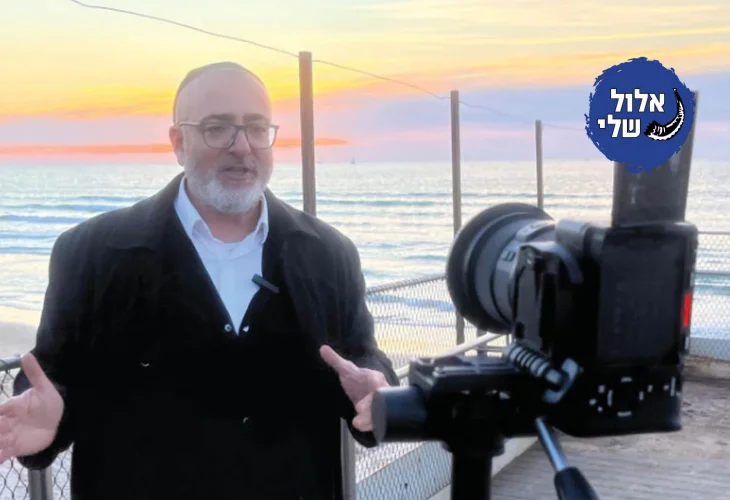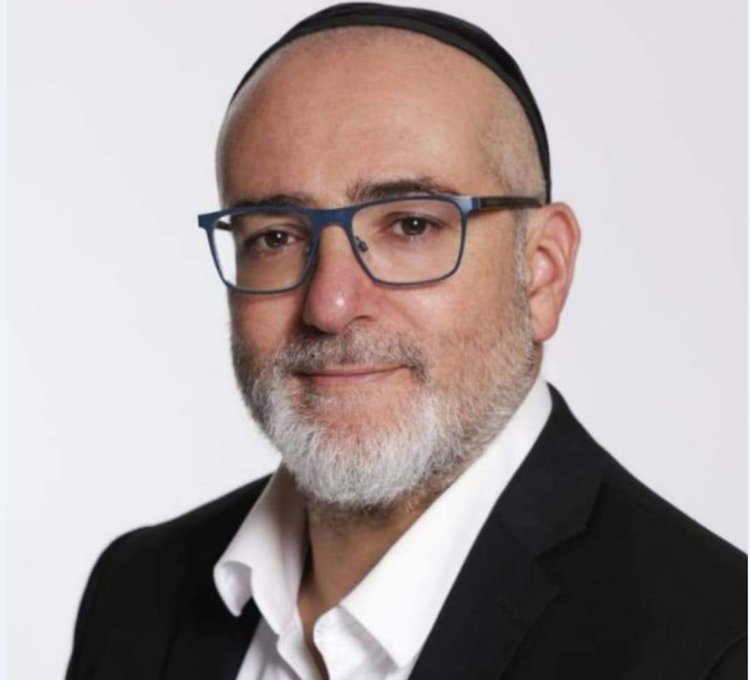From Navy Officer to Spiritual Leader: Elad Tzadikov's Journey
Elad Tzadikov, director of 'Together Organization,' discusses his first Elul after returning to faith, who he recently asked forgiveness from, and which piyyut moves him during the High Holy Days.

Nice to Meet You
"I'm Elad Tzadikov, 46 years old, married to Einat and father of five, residing in Herzliya. Over the past eleven years, I served on the Herzliya city council and as deputy mayor, working extensively to enhance the city's spiritual life. I had the honor of being the right-hand man to the city’s rabbi, Rabbi Yaakovowicz zt"l.
We worked hard to establish a Jewish culture department, a religious community center, funding for study programs, improving educational institutions, establishing religious schools, strengthening communities, and maintaining Jewish identity in public spaces.
Today, I manage 'Together Organization' – a movement for those returning to faith. Our main tasks include community networks, training community coordinators, structuring communities, addressing the educational challenges of the second generation, a phone helpline, advice and lectures, empowerment programs, employment integration, educational scholarships, and media impact."
How Has Your Life Changed Since Returning to Faith?
"I think I’ve become a much more community-oriented person. I’m more focused on and involved in advancing Klal Yisrael (the Jewish people) rather than my personal pursuits. Before returning to faith, I was deeply immersed in the business world, as CEO of Skaal Group’s fashion division. I studied for a degree in business at IDC Herzliya. The key motivation for me was amassing wealth and achieving business success, which I found to be empty. Intertwining Jewish identity and values into my life gradually shifted my focus from private business to public service.
Additionally, I personally experienced societal perceptions of the religious community in Israel. Having grown up in the stronghold of secular Israeli society, served as a naval commando in Unit 13, became a CEO at age 27, and graduated from IDC, I can say that changing the stigmatic perception of Israeli society towards religious individuals helped me understand deeply the change needed to elevate the expanding Jewish identity in the public sphere."
What Are the Greatest Challenges for Baalei Teshuva?
"Baalei Teshuva (those returning to faith) who begin their strengthening journey in their 20s, 30s, or 40s are usually just starting a family or already have one. They must start learning Torah from the very basics and at the same time introduce a Jewish direction at home. Balancing being an influential and steady parent, managing a Jewish marriage, and uplifting a Jewish home while still acquiring basic tools is a major challenge. Mistakes are common.

Moreover, they sometimes need to change their source of income or workplace. This might be because they were working in fields incompatible with a Jewish lifestyle or because they want to allocate specific time for learning or might be returning to the workforce after a period of studying in a Yeshiva. In practice, Baalei Teshuva are very absorbed in surviving their new lives and overcoming the challenges they face. Community involvement and social connections are often lacking, and there are very few communities that truly offer fertile ground for growth and empowerment.
As they progress, they encounter educational challenges. They face ideological components they hadn't considered when sending their children to religious schools, such as attitudes toward Memorial Day, Independence Day, military conflicts, and even Holocaust Remembrance Day. This is on top of acceptance challenges in schools and educational gaps since they do not have the foundational education in religious school subjects. These are precisely the challenges that our organization aims to provide solutions for: community building, training community coordinators, and connecting with resources at the local government, central government, and philanthropy levels as well as providing support and guidance in education and school admissions."
What Was Your First Elul Like After Returning to Faith?
"I was abroad at the beginning stages of returning, just learning the basic practices of what Elul is, what Selichot are, and so on. I began studying at the Netivot Olam Yeshiva a year later and only then started to understand deeper the significance of this time period.
Even today, Elul is complex and thought-provoking for me. To illustrate – I’m writing the answers to this interview on my way to a commanders’ tour in the north with the reserves, after being called up yesterday with an emergency order. A military reality, on the eve of maneuver, stressful and full of missions, doesn’t allow much time for internal spiritual focus. But if we understand that the whole purpose is to coronate Hashem in the world, for all of Israel, and we operate in this world from that perspective, it all aligns more appropriately, guiding us to influence and strengthen."
Which Song or Piyyut of the High Holy Days Moves You?
"There are piyyutim that I love or speak to me more, but I believe the real connection to prayer or piyyut comes from our emotional state at that moment. It's possible to be present at an uplifting Selichot prayer, but our thoughts wander, preoccupied with other matters. Sometimes one can reach deep emotion, tears, and inner movement precisely from a piyyut that hadn’t been noticed before or from a sparse prayer setting. What's different is our internal intention in that prayer, where I am positioned, how much weight I give to the intentional words, and the spirit of inner intention."
When Was the Last Time You Asked Someone for Forgiveness?
"I try to clear my heart and resolve issues in real-time, without holding grudges for long. Therefore, saying sorry is quite a routine interpersonal tool for me and not rare."
A Special Insight from the Past Year?
"In the final moments of 5784, a year that was by no means simple, but marked by immense spiritual awakening and a rising wave of return to faith that part of which already visits us – we understand more strongly today that the deep inner movement of Baalei Teshuva is more relevant and essential than ever. Our power is not only in learning and Torah, though this is certainly crucial, but also in creating forces and deep currents in society operating from Torah.
The initial perception of Baalei Teshuva fifty years ago was that they were merely compensating for a deviation that befell the Jewish people. Throughout history, the Jewish people kept Torah and mitzvot, except for short periods among few communities in the Diaspora. This perception led to neglecting the identity of Baalei Teshuva in those days, directing their strength to the Beit Midrash with a clear tendency toward ultra-orthodox separation from the world they knew. As it quickly became apparent, it didn’t work. Our identity is much richer, complex, embracing different shades and reflecting the levels of our lives.
If, until today, this aspect was perceived as a shortcoming within the religious community, our eyes now see the great advantages and qualities arising from it. This is not a mere historical lapse, but a divine plan to change reality.
Israeli culture is deeply influenced by the return to faith movement – music, cinema, drama series, visual arts, literary writing, exhibitions, and poetry. It seems like Judaism is bursting forth and speaking from every corner. Even among IDF soldiers and commanders, Torah is much more present than before, faith becomes the spirit on the battlefield during your going out and coming in along the way.
The media offers alternatives with weekly Torah portions in news broadcasts, with media leaders who respect and promote Judaism not with cynicism but with love and identity all over the world; the Jewish world becomes curious, accessible, appreciated, brave, breaking through ceilings, present, bold, and innovative. Thought leaders from all backgrounds are rediscovering their deep identity, all from an internal point of connection to their Beit Midrash and personal strengths. Public life today is more Jewish. The return to faith movement is full of vitality and growth, and the trend is clear – the Jewish people are returning to their identity.
But here comes our great role, as we are experiencing a historical event of broad spiritual strengthening among the people, we all need to muster the strength to create receptacles for this blessing and abundance. We must leave our comfort zones and move from personal to communal and national responsibility."

